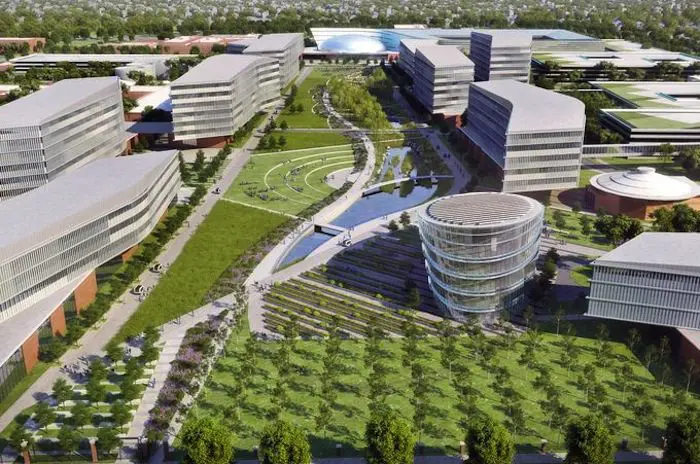
|
| A rendering of the planned revamped campus. Ford Motor Company |
DEARBORN — Before the rise of Islamophobia and allegations of sharia law, Dearborn had been known for its Ford legacy.
The city is the birthplace of Henry Ford, the visionary who implemented the moving assembly line to revolutionize manufacturing worldwide. It is also home to the Ford River Rouge plant and the company’s world headquarters.
Streets, schools, buildings and even private businesses in Dearborn are named after Ford and his family. The automakers are investing $1.2 billion in the city. Ford Motor Company is revamping its Dearborn campus in a 10-year plan with an emphasis on modernity in architecture, walkability, greenery and efficiency.
Besides redeveloping the headquarters on Michigan Ave., Ford is remodeling and rebuilding sites on Oakwood Blvd. The aim is to facilitate moving between the buildings and provide an improved working environment to the company’s 30,000 employees by 2026.
Dearbornites welcomed the automaker’s move, calling it a testament to the viability of the city and the community.
City Council President Susan Dabaja said Ford’s investment is a sign of commitment to continue to push Dearborn into the future.
Dabaja said Ford’s planned campuses will further revitalize Dearborn’s housing market.
“Property values will go up,” she said. “Hopefully, the number of rental homes will decrease. It is a great deal for the residents.”
Dabaja added that the project will help dispel some of the myths about Dearborn.
“Ford sees that the city is viable, that it has great potential,” she said. “Ford executives embrace the cultural diversity here. It is obvious that Ford is not influenced by the negative press we have been getting, because it is simply not true.”
Arabs and Ford
Ali Jawad, founder of the Lebanese American Heritage Club, also welcomed Ford’s plan.
Jawad said the Arab American community has a great relationship with the Ford Motor Company.
“The reason why Arabs came to Dearborn in the first place is because of Ford,” he said. “Everybody wanted to work at the Rouge plant. Ford and us have a history together. Ford’s loyalty to Dearborn is great news for our community because we are invested in this city.”
Jawad complained about the city’s building regulations, wishing that Dearborn administrators will make it easy for Ford to move forward with its project.
“It’s not easy to do business here,” he said. “Construction companies don’t like to work in Dearborn because they have to go through a long bureaucratic process to get a permit.”
Jawad said he hopes the project will spark reform in the Building and Safety Department.
Fay Beydoun, the executive director of the American Arab Chamber of Commerce, said the plan renews the trust in the local business community.
“This is a positive step from an economic development viewpoint for our community,” she said. “As Ford develops and builds new campuses, we have a large number of small Arab American-owned businesses and restaurants in Dearborn. In one way or another, what they are investing in Dearborn will trickle down to the community.”
Beydoun said the Arab American community’s entrepreneurship is a continuous force of economic revival in Dearborn. She said Warren Ave., a booming business district today, was a ghost town in the 1980s before Arab Americans started opening shops there. She added that Arab business ownership is also expanding in west Dearborn.
The Arab residential base has also stabilized the housing market, she said.
“The Ford Motor Company has always been headquartered in Dearborn, but they also do see that the upward trajectory of economic development here,” Beydoun said. “If they had seen the city of Dearborn in a slump, I don’t think they would invest all of this.”
Suehaila Amen, the international admissions and recruiting coordinator at University of Michigan-Dearborn, also praised the project, calling it exciting.
“With Ford investing $1.2 billion into the community in which they have been housed since their inception, it’s showing the world that this is a place that welcomes all communities; this is a place that will continue to flourish and develop,” she said.
Amen lauded Ford for welcoming and employing immigrants for more than a century. She said the company and its nonprofit foundation have supported community initiatives, schools and organizations.
“They see the potential for continued growth here,” she said. “They’re not only invested in the city, but also in everything that is in and around the city.”
Amen said Arab Americans are connected to Ford. She said her grandfather worked at the company in the 1940s and later bought stocks in the company.

Official praise
Gov. Snyder and U.S. Rep. Debbie Dingell (D- Dearborn) applauded Ford’s plans.
“Today’s announcement further proves that Michigan is poised to be a leader throughout the 21st century, with the automotive industry helping to guide the way by ushering in new advancements in technology and innovation,” Snyder said in a statement on Tuesday.
He added that companies like Ford are helping Michigan build a modern economy based on retaining and recruiting talent.
Dingell said she was delighted when she heard about the project.
“This important investment in Michigan employees and the future of the auto industry will help attract emerging businesses and even more people to Michigan — and also ensure that Michigan remains the center of the world’s automotive competitiveness, a designation we will not cede to any other state or country,” the congresswoman said in a statement.






Leave a Reply